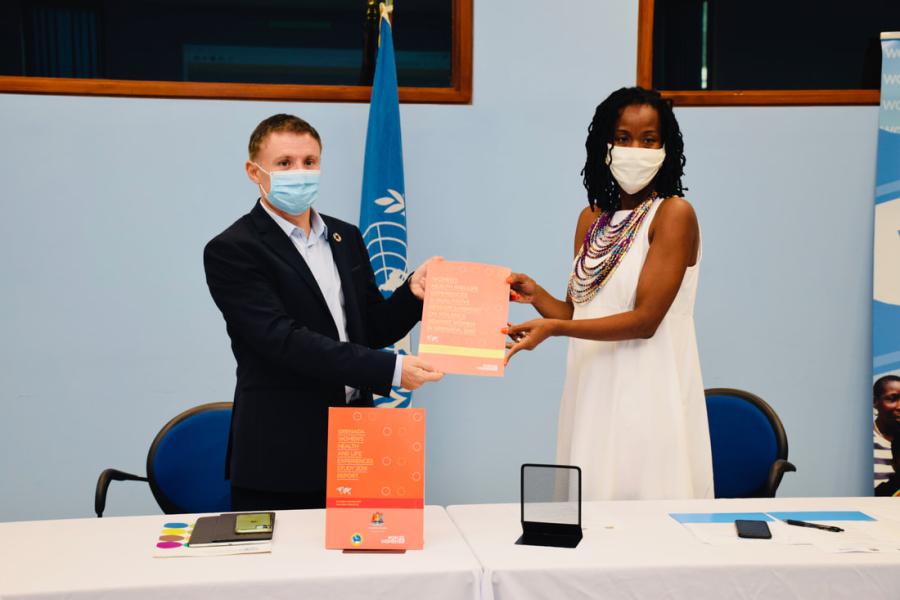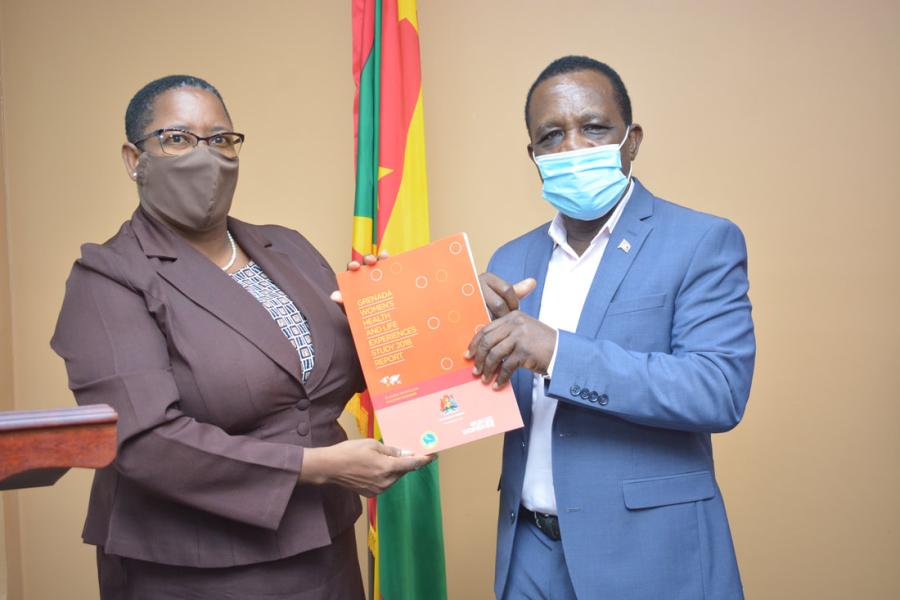1 in every 3 women in Grenada will experience Intimate Partner Violence
18 August 2020
- The first comprehensive national survey on gender-based violence (GBV) in Grenada revealed that 29% of all women experienced at least one form of violence, in line with the global average that 1 in 3 women will experience physical and or sexual violence during their lifetime.

These findings are only a small fraction of the data available via the “Caribbean Women Count: The Ending Violence against Women and Girls Data Hub.”. The result of a collaboration between UN Women and the Caribbean Development Bank (CDB), the hub provides data from five national reports on GBV prevalence in an easily accessible and interactive virtual space.
Prime Minister of Grenada, Dr. the Right Honourable Keith Mitchell delivering feature remarks to launch the hub said: "Sisters and brothers, violence against women and girls hurts the moral fabric of our society. Let us redouble our efforts to stamp out this human rights violation that is robbing them of their pride, dignity and sense of well-being and security".

The Grenada Women’s Health and Life Experiences Survey was conducted using the CARICOM model, a measurement adapted from the original World Health Organization global model for assessing the prevalence of violence against women in the Caribbean. The key findings reveal that emotional abuse, the most common form of IPV; and physical violence are more prevalent than sexual violence:
- One in every four Grenadian women has suffered physical violence at some point in their life.
- Close to one in every ten Grenadian women has experienced sexual violence over her lifetime.
- Emotional abuse is the most common form of IPV and is suffered by about three in every 10 Grenadian women.
- Among the 26.9 per cent of Grenadian women who suffer lifetime physical violence from their intimate partner, for more than two-thirds of them this violence is severe – hitting, kicking, burning or threatening with a weapon.
- For many women, the abuse does not stop during pregnancy. Among ever-pregnant women, 5.3 per cent reported being beaten during at least one pregnancy, including in her stomach.
- Over their lifetime, almost one in every four Grenadian women will have experienced at least one form of non-partner sexual violence which includes acts of rape (10.7%); attempted rape (10.4%); and unwanted sexual touching (15.5 %).
Head of Office a.i., UN Women Multi-Country-Office Caribbean, Ms. Tonni Brodber, said: “The government of Grenada and Civil Society have developed and implemented many initiatives to end violence against women and girls. Gender statistics are critical to ensuring the targeted impact and sustainability of these initiatives. Often statistics can seem intangible, the Caribbean Women Count: The Ending Violence against Women and Girls Data Hub brings the data to life. It is a constant reminder that when we speak about 1 in 3 this is an issue of life and death for many.”
The study, conducted under a partnership between UN Women and the Government of Grenada, was co-financed by the CDB.
CDB Vice-President (Operations) (Ag.), Diana Wilson Patrick said: “With this survey, Grenada joins Suriname, Guyana, Jamaica and Trinidad and Tobago, in having national data on the progress on Sustainable Development Goals Target 5.2, which addresses elimination of violence against women and girls. In making the data available, we hope to mobilise women who experience violence to seek help, inform advocacy and evidence-based policy and spur action.”
This study provides critical, reliable information on the experiences of Grenadian women and girls on prevalence and incidence of violence perpetrated by intimate partners and non-partners. It also provides insights into the range of factors associated with such violence and which ones may put them at more risk or protect them. For each additional controlling behaviour exhibited by the partner, the prevalence of all forms of IPV increases.
Report Links:

Carol A. Gaskin
In her capacity, she leads communication and advocacy efforts for the UN Resident Coordinator's Office, overseeing operations in 10 Eastern Caribbean countries. Additionally, she chairs the UN Communications Group, fostering collaboration among communicators from 18 agencies.
Carol's expertise lies in developing communication strategies aligned with the Sustainable Development Goals and the 2030 Agenda. She excels in storytelling, utilizing various channels to amplify the UN's message effectively.
Her achievements include coordinating impactful events such as the "UN in the City" SDG exhibition and spearheading initiatives like the introduction of the Caribbean's first SDG-branded electric bus. Notably, Carol has received recognition for her outstanding work, including the Best Annual Results Report for Latin America and the Caribbean in 2023.
Her work extends to humanitarian efforts, notably providing coverage during natural disasters like the La Soufriere eruption.
With a proven track record of success and dedication to advancing global priorities, Carol A. Gaskin is a respected figure in the field of international development and strategic communication.



